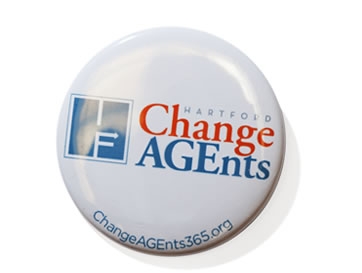Creating
Change
Every Day


The Hartford Change AGEnts Initiative celebrated the end of its first year in December 2014 with its inaugural annual conference in Philadelphia. More than 160 Change AGEnts came together for an intensive day-and-a-half of interactive workshops, small group consultancies, an inspiring keynote address by Billions Institute co-founder Joe McCannon, updates from the Change AGEnts Networks, community building, networking, and much more. The conference highlighted how much progress has been made day by day throughout the year. The event energized and helped equip Change AGEnts with the knowledge and skills to continue creating sustainable, large-scale change each day in this and coming years.
We are, as the U.S. Census Bureau titled a 2014 report, An Aging Nation.
The John A. Hartford Foundation could have written the headline decades ago. Starting in the 1980s, when forecasters clearly noted the aging demographics now in full force, the Foundation embarked on a strategy to support geriatric research, education, and dissemination of evidence based models of care. The idea was to train a cadre of doctors, nurses, and social workers expert in the care of older adults. Thirty years later, we are proud to have played a role in the development of many faculty and researchers in the health professions. Students today continue to benefit because of our work embedding geriatrics content into the curricula of schools of medicine, nursing, and social work.
Complementing this effort to build academic capacity in geriatrics, the Foundation sought to develop and test models of care that deliver better outcomes and care at a lower cost—the types of models that would offer the quality of care older adults deserve. Clinics and systems across the country, for example, have adopted Collaborative Care, a Foundation-supported, team-based model formerly known as Project IMPACT, that delivers effective depression treatment for older patients in primary care settings. Another Foundation-backed program, the Care Transitions Intervention, has been shown to decrease unnecessary hospital readmissions by engaging community partners to coach older patients following discharge.
The enriched academic capacity in geriatrics and the successful models of care that the Foundation has helped nurture for 30 years represent important progress, but there is still much to be done.
The care of older adults with chronic conditions in our health care system today remains largely dysfunctional, taking a devastating toll in unnecessary human suffering and useless costs. Older adults still experience high rates of medical errors and adverse events due to low-quality, inexpert health care. Society as a whole also suffers. We pay for these high-cost, low-quality services through public programs, and we are deprived of the continuing contributions that older Americans could make if they received more appropriate care.
In 2011, the leading edge of the “baby boom” cohort began turning 65 and the Foundation recognized that the context in which we were working had substantially changed. Our nation’s health care environment was more dynamic than ever. The Affordable Care Act was creating opportunities to fundamentally change the way health care was delivered to older Americans.
We undertook a rigorous review of our grantmaking strategies in light of the enormous challenges our society faces and developed a new strategic plan to guide our work.
While still firmly rooted in aging, our work has now shifted “downstream” from academic capacity building to creating the more immediate practice and policy changes needed to improve the delivery of care to older adults at a time when 10,000 people are turning 65 every day.
“You don’t have to spend much time with the elderly or those with terminal illness to see
how often medicine fails the people it is supposed to help... Our reluctance to honestly
examine the experience of aging and dying has increased the harm we inflict on people
and denied them the basic comforts they most need. Lacking a coherent view of how
people might live successfully all the way to their very end, we have allowed our fates
to be controlled by the imperatives of medicine, technology, and strangers.”
—Atul Gawande, from “Being Mortal”
We acknowledge that some of the questions regarding how to improve care for older Americans do not have answers—at least not yet. The Foundation is willing to take on the challenging task of supporting programs and projects that show real potential to develop those answers, as well as to help spread care models that successfully demonstrate their effectiveness in reducing costs while improving outcomes for older Americans.
Our strategic planning process identified five interconnected grantmaking areas we believe are critical to transforming our nation’s health care for older adults. They are:
You will learn more about each of these strategies and associated grant portfolios here.
This annual report not only provides a description of each of the strategies noted above, but focuses on the Hartford Change AGEnts Initiative, the signature program of the Interprofessional Leadership in Action portfolio. This project, which completed its first full year in 2014, aims to engage and support all prior Foundation health and aging grantees to focus on making systemic, large-scale practice change in the care of older Americans.
We know only too well how our current health care system is failing older adults. We hear the litany whenever we talk with grantees, other geriatrics experts, or anyone who has encountered the health care system: medication mistakes, polypharmacy, under-treatment or over-treatment, the failure to plan, the lack of attention to patient and family goals of care, and so many more. Through the Hartford Change AGEnts Initiative, we are challenging ourselves and our grantees to address these issues and deliver on the promise of improved care for older Americans.
This won’t be accomplished overnight. Creating real change requires a focused and sustained effort, day after day, 365 days a year. Our Hartford Change AGEnts (see Harnessing the Power of Hartford Change AGEnts) understand that and are committed to doing the hard work necessary to improve the lives of older adults and their families.